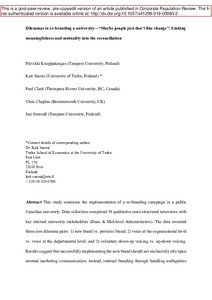Dilemmas in Re-branding a University - “Maybe People Just Don’t Like Change”: Linking Meaningfulness and Mutuality into the Reconciliation.
Kuoppakangas Päivikki; Suomi Kati; Clark Paul; Chapleo Chris; Stenvall Jari
https://urn.fi/URN:NBN:fi-fe2021042822526
Tiivistelmä
This study examines the implementation of a re-branding campaign in a public Canadian university. Data collection com-prised 19 qualitative semi-structured interviews with key internal university stakeholders (Dean and Mid-level Administrators). The data revealed three core dilemma pairs: (1) new brand vs. previous brand; (2) voice at the organisational level vs. voice at the departmental level; and (3) voluntary down-up voicing vs. up-down voicing. Results suggest that successfully implementing the new brand should not exclusively rely upon internal marketing communication; instead, internal brand-ing through handling ambiguities and addressing emerging dilemmas by enhancing engagement, building mutuality and unlocking the meaning in the re-branding can help improve success. This study reveals that implementing a re-branding campaign in higher education involves embracing the world of dilemmas by involving and empowering employees in dilemma reconciliation. The reconciliation of detected brand-related dilemmas with and by employees can be achieved by involv-ing employees in the process of re-branding from the beginning. Indeed, this paper suggests the preparedness to detect and address dilemmas is central to successful re-branding. Our results indicate that traditional change management approaches produce unreconciled dilemmas that hinder the implementation of the new brand. We conclude that efforts to build employee engagement in re-branding do not build employee supportiveness towards the new brand unless core dilemmas are reconciled.Keywords Re-branding· Internal branding· Dilemma theory· Higher education· Public sector
Kokoelmat
- Rinnakkaistallenteet [27094]
